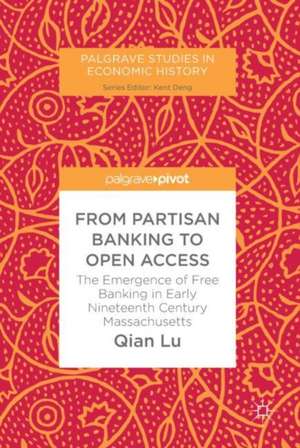From Partisan Banking to Open Access: The Emergence of Free Banking in Early Nineteenth Century Massachusetts: Palgrave Studies in Economic History
Autor Qian Luen Limba Engleză Hardback – 23 oct 2017
Din seria Palgrave Studies in Economic History
- 20%
 Preț: 939.27 lei
Preț: 939.27 lei -
 Preț: 357.88 lei
Preț: 357.88 lei -
 Preț: 497.34 lei
Preț: 497.34 lei - 17%
 Preț: 361.80 lei
Preț: 361.80 lei -
 Preț: 292.28 lei
Preț: 292.28 lei - 15%
 Preț: 580.36 lei
Preț: 580.36 lei - 20%
 Preț: 690.47 lei
Preț: 690.47 lei - 17%
 Preț: 361.38 lei
Preț: 361.38 lei - 18%
 Preț: 945.79 lei
Preț: 945.79 lei - 18%
 Preț: 1012.53 lei
Preț: 1012.53 lei -
 Preț: 384.31 lei
Preț: 384.31 lei - 15%
 Preț: 587.85 lei
Preț: 587.85 lei - 15%
 Preț: 700.29 lei
Preț: 700.29 lei - 18%
 Preț: 782.42 lei
Preț: 782.42 lei - 15%
 Preț: 644.82 lei
Preț: 644.82 lei -
 Preț: 232.82 lei
Preț: 232.82 lei - 18%
 Preț: 899.21 lei
Preț: 899.21 lei - 18%
 Preț: 786.66 lei
Preț: 786.66 lei -
 Preț: 397.97 lei
Preț: 397.97 lei -
 Preț: 388.90 lei
Preț: 388.90 lei - 18%
 Preț: 737.57 lei
Preț: 737.57 lei -
 Preț: 387.20 lei
Preț: 387.20 lei - 15%
 Preț: 647.73 lei
Preț: 647.73 lei - 15%
 Preț: 646.62 lei
Preț: 646.62 lei -
 Preț: 422.90 lei
Preț: 422.90 lei - 18%
 Preț: 955.40 lei
Preț: 955.40 lei -
 Preț: 419.06 lei
Preț: 419.06 lei - 15%
 Preț: 459.06 lei
Preț: 459.06 lei - 15%
 Preț: 712.22 lei
Preț: 712.22 lei - 18%
 Preț: 787.47 lei
Preț: 787.47 lei - 18%
 Preț: 1128.57 lei
Preț: 1128.57 lei - 18%
 Preț: 949.55 lei
Preț: 949.55 lei - 15%
 Preț: 471.53 lei
Preț: 471.53 lei - 15%
 Preț: 640.88 lei
Preț: 640.88 lei - 18%
 Preț: 898.26 lei
Preț: 898.26 lei - 18%
 Preț: 1394.21 lei
Preț: 1394.21 lei - 18%
 Preț: 730.47 lei
Preț: 730.47 lei - 15%
 Preț: 711.56 lei
Preț: 711.56 lei - 18%
 Preț: 783.98 lei
Preț: 783.98 lei - 18%
 Preț: 900.01 lei
Preț: 900.01 lei - 18%
 Preț: 896.08 lei
Preț: 896.08 lei - 15%
 Preț: 705.83 lei
Preț: 705.83 lei - 18%
 Preț: 787.15 lei
Preț: 787.15 lei - 15%
 Preț: 704.69 lei
Preț: 704.69 lei - 18%
 Preț: 1112.48 lei
Preț: 1112.48 lei -
 Preț: 384.31 lei
Preț: 384.31 lei
Preț: 391.99 lei
Nou
Puncte Express: 588
Preț estimativ în valută:
75.01€ • 78.16$ • 62.11£
75.01€ • 78.16$ • 62.11£
Carte tipărită la comandă
Livrare economică 03-17 aprilie
Preluare comenzi: 021 569.72.76
Specificații
ISBN-13: 9783319676449
ISBN-10: 331967644X
Pagini: 189
Ilustrații: XXVIII, 189 p. 47 illus., 45 illus. in color.
Dimensiuni: 148 x 210 mm
Greutate: 0.51 kg
Ediția:1st ed. 2017
Editura: Springer International Publishing
Colecția Palgrave Pivot
Seria Palgrave Studies in Economic History
Locul publicării:Cham, Switzerland
ISBN-10: 331967644X
Pagini: 189
Ilustrații: XXVIII, 189 p. 47 illus., 45 illus. in color.
Dimensiuni: 148 x 210 mm
Greutate: 0.51 kg
Ediția:1st ed. 2017
Editura: Springer International Publishing
Colecția Palgrave Pivot
Seria Palgrave Studies in Economic History
Locul publicării:Cham, Switzerland
Cuprins
Chapter 1: Was the U.S. Born Modern?.- Chapter 2: The History of Partisan Banking.- Chapter 3: Empirical Studies on Bankers, Legislators, and Political Parties, 1790–1859.- Chapter 4: Empirical Studies on Political Connection of Suffolk Legislators, 1790–1859.- Chapter 5: Empirical Studies on Bankers’ Wealth and Bank Balance Sheets.- Chapter 6: An Intra-Elite Explanation of Open Access.- Chapter 7: Conclusion: Democracy, Civil Society, Elites, and Impersonal Rules.
Notă biografică
Qian Lu is Assistant Professor at the School of Economics, Central University of Finance and Economics in Beijing, China.
Textul de pe ultima copertă
How did banking in early nineteenth-century Massachusetts evolve? Lu provides a compelling narrative about the connection between inclusive political systems and open access economies, hypothesizing that entry into banking was firstly made upon partisan grounds before later becoming open access/free entry. Lu investigates state level institutional change and studies the transition to open access from an economic perspective. What was the relationship between banking and political elites? Why were elites, who enjoyed privileges under dominant institutions, willing to dissolve these institutions and eliminate their privileges? The author provides new insights into American economic history, explaining how a society moves from limited access to one of openness.
Caracteristici
Explores how the USA evolved into a modern society in the sense of impersonal rules and open access of organizations Argues that the USA was not born modern in the sense of competitive economy and polity, shown by early nineteenth-century banking Provides an explanation of open access banking based on the conceptual framework of intra-elite competition Includes supplementary material: sn.pub/extras
